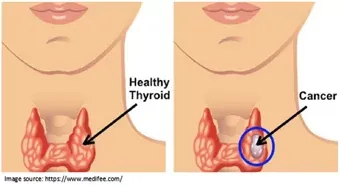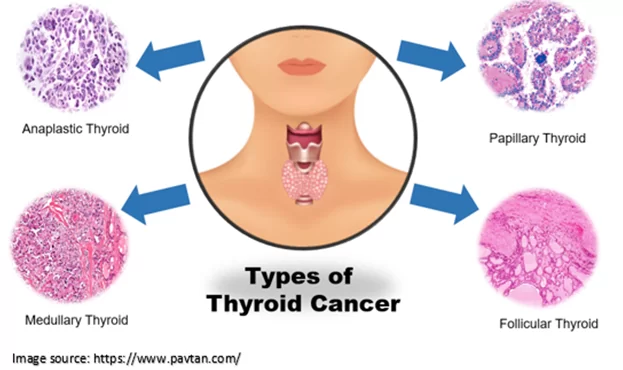Thyroid Tumor Treatment in Bangalore
Thyroid cancer develops in the thyroid gland, part of the endocrine system. Hormones produced by the thyroid gland regulate body temperature, heart rate, and metabolism.
Thyroid can develop many different diseases. There can be cysts, nodules or tumours (cancer or non-cancer). Some of these may need treatment.
The most common types of thyroid cancer, papillary and follicular, respond well to treatment. The majority of thyroid cancers are curable.
At MACS Clinic, Dr. Sandeep Nayak, one of the leading surgical oncologist in Bangalore, India, is dedicated to helping patients, regardless of their situation. He strives to provide comprehensive and result-oriented thyroid cancer treatment in Bangalore, India. He also the inventor for RABIT technique of Robotic thyroid surgery.
In addition, Dr. Sandeep Nayak is highly skilled in laparoscopic and robotic cancer surgeries and inventor of RABIT thyroidectomy. Cancer treatment in Bangalore is more successful and less invasive than ever before, thanks to these cutting-edge surgical techniques available at MACS Clinic.
Though diseases of thyroid are common most many not need surgical treatment. However, any tumor suspected to be cancer of thyroid needs surgery. So, we have discussed various aspects of thyroid cancers bellow.
Please read this helpful article to know more about advanced and effective thyroid cancer treatment in Bangalore, India.
Let’s begin by understanding,
What is Thyroid Cancer, and How does it affect you?
The thyroid, a small butterfly-shaped gland at the base of your neck, develops thyroid cancer. Hormones produced by this gland regulate your metabolism.
Thyroid hormones are also involved in regulating body temperature, blood pressure, and heart rate. Thyroid cancer is a type of endocrine cancer that is usually very treatable and has a high cure rate.
Now, let’s know,

Thyroid Cancer Treatment in Bangalore
Thyroid cancer treatments vary depending on the type of cancer, tumor size, staging, and whether or not cancer has spread.
Surgery is the most important treatment for thyroid cancer. Depending on the size and location of the tumor, your surgeon may remove a portion of the thyroid gland; this procedure is known as lobectomy or the entire gland, a total thyroidectomy. Your surgeon may remove any lymph nodes in the area where cancer has spread.
Surgery for Thyroid Cancer
i. Traditional open surgery
ii. Minimally Invasive Thyroid Surgery (MITS)
iii. Robotic-assisted Breast-axilloInsufflated Thyroidectomy (RABIT)
It is a new robotic thyroidectomy technique invented by Dr. Sandeep Nayak that uses the da Vinci robotic system. For benign and malignant thyroid tumors, we can perform RABIT- robotic thyroidectomy, which has all the advantages of robotic surgery.
The procedure is carried out through the armpit skin fold with small wounds that leave minor scars.
To view and preserve vital structures around the thyroid, robotic instrumentation provides exceptional 3D vision and high magnification. As a result, the surgical quality is unmatched by any other modality.
iv. Laparoscopic (Endoscopic) Thyroid Surgery
Diagnosis of Thyroid Tumor in Bangalore
Blood tests: A thyroid blood test examines hormone levels and determines whether or not your thyroid is working properly.
Fine-needle aspiration biopsy: The doctor removes cells from your thyroid to test for cancer cells during a fine-needle aspiration cytology (FNAC). If cancer cells have spread to lymph nodes, a FNAC can be used to determine this. Ultrasound technology may be used to guide these biopsy procedures.
Imaging tests: Thyroid cancer and cancer spread can be detected using imaging scans like CT scan in some cases.
Now, let’s know more about,
Types of Thyroid Cancer
Papillary Thyroid Cancer
This is the most common type of thyroid cancer, accounting for roughly 80% to 85% of all diagnoses. It is one of the most treatable cancers.
Follicular Thyroid Cancer
This type of thyroid cancer accounts for about 10% to 15% of all thyroid cancers. It is more aggressive than papillary thyroid cancer and can spread to the rest of the body through the bloodstream.
Hurthle cell cancer, a rare follicular thyroid cancer, is particularly aggressive.

Medullary Thyroid Cancer
This cancer accounts for less than 3% of thyroid cancers. It can spread to lymph nodes.
Anaplastic Thyroid Cancer
This cancer has a worse prognosis and does not respond to any treatment. Less than 2% of thyroid cancers fall into this category. It is the most aggressive thyroid cancer that advances quickly.
Symptoms of Thyroid Cancer
If you have a thyroid nodule, don’t be worried. A thyroid nodule is a lump or growth in your neck that you or your doctor may feel. The majority of nodules are harmless (non-cancerous). Only about three of every twenty thyroid nodules are malignant.
Other symptoms of thyroid cancer may include:
Causes & Risk Factors of Thyroid Cancer
A variety of unknown factors cause thyroid cancer. However, there are several known potential risk factors, some of which can be altered, and others, such as your age and gender, cannot.
The following are the risk factors for thyroid cancer:
Thyroid Cancer Stages

The age of the person at diagnosis — precisely, whether they are younger or older than 55 — and the extent to which thyroid cancer cells have spread determine the staging of papillary or follicular thyroid cancers. Age is not taken into account when staging anaplastic and medullary thyroid cancers.
TNM Staging
Your doctor may use the TNM system to stage your cancer. This system provides a common shorthand and helps illustrate a clearer picture of your cancer.
TNM is an acronym for:
- T stands for tumor. What is the exact size of your tumor?
- N is the number of nodes. Have your lymph nodes been affected by cancer?
- M stands for Metastasis. Has cancer progressed to other organs?
For patients aged less than 55 years of age, Thyroid cancers of the papillary and follicular types are classified as Stage I&Stage II.
Whereas, For patients above 55 years of age, Thyroid cancers of the papillary and follicular types are classified as Stage I, Stage II, Stage III, Stage IVA, or Stage IVB. These stages, as well as Stage IVC, are present in medullary thyroid cancer.
All anaplastic thyroid cancers are classified as Stage IV; the extent of spread determines whether they are classified as Stage IVA, IVB, or IVC.
Frequently Asked Questions
Who is at risk for thyroid cancer?
What are some of the complications of thyroid cancer?
Most thyroid cancers are treatable and do not pose a life-threatening risk. Thyroid hormones are still required for your body to function after thyroid surgery or treatments.
You will need thyroid hormone replacement therapy for the rest of your life. Synthetic thyroid hormones are designed to replace thyroid hormones that your body no longer produces naturally.
When should I consult the doctor?
If you have a swelling in front of the neck or are experiencing the following symptoms, you should contact your doctor.
- Lump in the neck with NO OTHER symptom
Delayed symptoms include:
- Any nodule in side of the neck
- Change in voice
- Difficulty in swallowing
- Heaviness in neck
